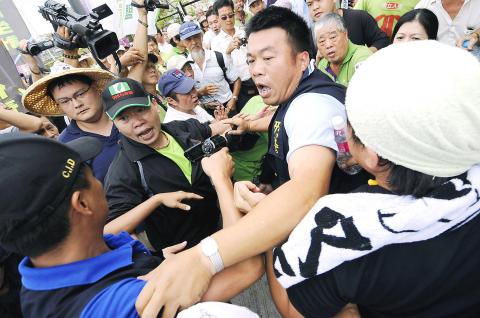|
KMT heavyweights call for party unity
By Mo Yan-chih / Staff reporter, in Greater Taichung

Members of several groups and
organizations protest outside the Greater Taichung venue of the Chinese
Nationalist Party’s (KMT) national congress yesterday.
Photo: Chen Chih-chu, Taipei Times
President Ma Ying-jeou (馬英九) yesterday
renewed his pledge to reform the party and defended a controversial change to
the Chinese Nationalist Party (KMT) charter to make a KMT head of state
automatically party chairman to enhance party-state cooperation at the KMT’s
19th national congress in Greater Taichung.
“I ran for KMT chairman twice over the past four years to deepen party reform
and unity… The new system will enhance close cooperation between the party and
the government, and I will be cooperative even it means my chairmanship will be
cut short in one-and-a-half years,” he told the convention.
Delegates later applauded the proposal in the discussion session, despite some
opposition from those who said the measure would enable Ma to avoid his
responsibility if the party suffered electoral defeat next year and it ensures
Ma’s party chairmanship until 2016 regardless of the KMT’s performance in the
municipal seven-in-one elections next year and the 2016 presidential election.
As Ma was formally sworn in as party chairman following his re-election in July,
he called for party unity and vowed to lead the KMT forward, while defending his
efforts to secure more success in future elections.
“The seven-in-old local elections will be a crucial moment for the people to
examine the KMT. To obtain an electoral victory next year, we need unity and
support from all party members,” he said.
The KMT congress, postponed since September due to fears of large-scale
protests, was held at the Taichung Stadium in Greater Taichung’s Wuci District
(梧棲).
Tight security at the congress did not stop protestors from gathering outside
the venue starting at 6am, throwing shoes and chanting protests against Ma and
the party.
Ma described the protests as a norm in the democratic society, and promised to
address public discontent and enhance communication with Taiwanese.
“We need to communicate with the people and improve our performance… We did pay
attention to the people who voiced their concerns [outside the venue], and we
will address the issues they raised,” he said.
Presenting six promises to the public, Ma pledged to focus the government’s
efforts to improve food safety, residential justice, establish a nursing system
for the elderly and boost rural development, cultural creativity and regional
economy.
Amid the latest food scare involving cooking oils, Ma said the government will
establish a food safety fund to increase manpower and allocate funds to enhance
food safety while handing down severe punishment to food producers who break the
law.
“The penalties given to those who receive illicit gains will have no limits,” he
said.
Party unity is a major issue for the KMT amid the unresolved disputes between Ma
and Legislative Speaker Wang Jin-pyng’s (王金平) over allegations that he was
involved in improper lobbying, as party heavyweights and delegates called for
reconciliation.
Speaking at the congress, former KMT chairman Wu Poh-hsiung (吳伯雄) urged party
leaders to handle issues with more kindness and wisdom given the public
discontentment with the government.
He teared up as blamed the media for finding fault with the KMT, and called for
party unity to meet public expectations.
“The public still has high expectations of the KMT. We are a kind and righteous
party, and are not good at political wrangling… Taiwan needs us and we cannot
let the public down,” he said.
Wu’s speech was received by loud applause from party delegates, and both Ma and
Wang greeted him as he stepped down from the podium.
Wu later dismissed speculation that he was referring to the president in his
speech, adding that maintaining party unity is a collective effort.
In an effort to create a sense of reconciliation, Ma, Wang and other party
heavyweights, including Vice President Wu Den-yih (吳敦義) and Premier Jiang
Yih-huah (江宜樺), were seated side by side at the event.
At the congress’ concluding session, Ma expressed his gratitude to Wu Poh-hsiung
for boosting party morale with his speech and promised to consolidate the KMT.
“The KMT must push forward with its internal reform drive and only by standing
united can we continue to be in power,” Ma said.
The Democratic Progressive Party (DPP) said Ma’s remarks at the conference,
about how he “has heard the people’s voice” were insufficient because what he
needs to do is take action to solve the public’s grievances.
“Saying: ‘I’ve heard you’ and ‘I understand what you are saying’ is not good
enough,” DPP spokesperson Wang Ming-shen (王閔生) said.
“The administration needs to face the issues at hand, such as the sluggish
economy, rising commodity prices, the deteriorating human rights situation and
the food safety crisis with honesty and present solutions to these problems,” he
added.
Changing the time and location of the KMT congress and deploying thousands of
police officers are not going to ease public discontent, the DPP spokesperson
said.
Additional reporting by Chris Wang
|
![]()
![]()
![]()